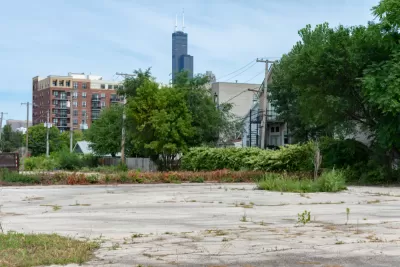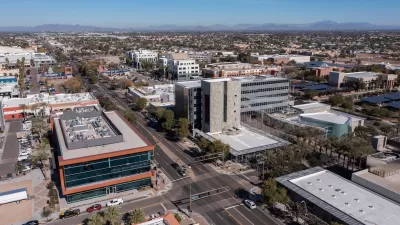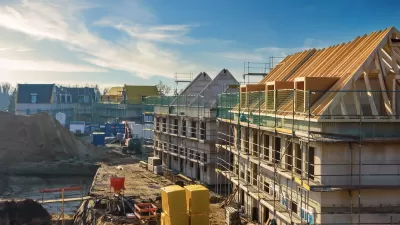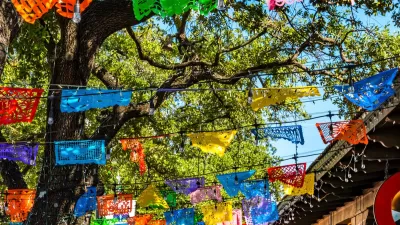Learn more about the various impacts of buying out private property with the intent of furthering urban development.

Governments or businesses can buy out property for a variety of reasons. This practice exists in an ethical gray area, but buying out private property has the potential to benefit all parties involved.
Environmental Impacts
How land is used affects the environment. When people use the land for agricultural purposes, it can have a negative ecological impact. The production of meat and produce can create harmful emissions, use up natural resources and destroy local ecosystems. If the private property used for agricultural production is bought out, there is potential to see a reduction in harmful environmental impacts.
Buyouts of private property can result in environmental and economic benefits for the surrounding community. The purchaser can repurpose bought-out property to benefit the environment or prevent damage from natural disasters. Houses prone to flooding can be bought out and turned into barriers against rising waters. The new owners of farmland can return the land to its original state. When someone buys out a property, an opportunity for positive ecological change arises.
How buying out affects communities
The United States tends to use single-use zoning for housing and development—a practice that restricts land to a particular type of use. Communities can be somewhat cut off when single-use zoning is used for housing development. Commercial and institutional buildings will be out of reach for many people living in single-use zones used for housing.
Sometimes, private property is unwanted. For many reasons, an owner of the structure or land might no longer want to keep ownership. Inherited property can create a financial burden when insurance, taxes, mortgages and other debts fall onto the new owner. Owners that don’t want to keep their property might allow it to be foreclosed or abandoned.
There are programs in place that allow communities or local governments to take ownership of foreclosed or unwanted land or buildings rather than leaving them to degrade. Some property is also undeveloped and vacant. Buying out private property for urban development can benefit the entire community in a variety of ways:
- Surrounding market value will rise: Rebuilding or renovating the property after it is bought out will contribute to higher property values in the surrounding area.
- Buyouts will address safety concerns: An empty or abandoned building poses safety and security risks. The new owner can tear down structures or fix safety issues once they buy the property out.
- Redevelopment will offer new opportunities: Depending on zoning restrictions, the redeveloped property could become new housing, businesses, or a recreation facility for the community.
The acquisition of private property provides an opportunity for a community to turn the space into something new. While the private ownership of such land benefits the owner, acquiring it can benefit the broader community.
Economic impacts
During a buyout, the owner of the property can also benefit. For example, the United States government can acquire private property, but only if it compensates the owner for fair market value. Governments and businesses who want to acquire private property must pay market rates or higher, and this effectively limits the amount of property they can buy out. The owner of the property will also benefit financially from the process.
The process can be beneficial
The process of buying out private property can be a challenging process. However, there are situations where private property is more beneficial when someone buys it out. A buyout and redevelopment can create residential or commercial space, reduce environmental strain by keeping development in or near existing neighborhoods, and breathe new life into underutilized properties and communities.

Alabama: Trump Terminates Settlements for Black Communities Harmed By Raw Sewage
Trump deemed the landmark civil rights agreement “illegal DEI and environmental justice policy.”

Planetizen Federal Action Tracker
A weekly monitor of how Trump’s orders and actions are impacting planners and planning in America.

The 120 Year Old Tiny Home Villages That Sheltered San Francisco’s Earthquake Refugees
More than a century ago, San Francisco mobilized to house thousands of residents displaced by the 1906 earthquake. Could their strategy offer a model for the present?

Indy Neighborhood Group Builds Temporary Multi-Use Path
Community members, aided in part by funding from the city, repurposed a vehicle lane to create a protected bike and pedestrian path for the summer season.

Congestion Pricing Drops Holland Tunnel Delays by 65 Percent
New York City’s contentious tolling program has yielded improved traffic and roughly $100 million in revenue for the MTA.

In Both Crashes and Crime, Public Transportation is Far Safer than Driving
Contrary to popular assumptions, public transportation has far lower crash and crime rates than automobile travel. For safer communities, improve and encourage transit travel.
Urban Design for Planners 1: Software Tools
This six-course series explores essential urban design concepts using open source software and equips planners with the tools they need to participate fully in the urban design process.
Planning for Universal Design
Learn the tools for implementing Universal Design in planning regulations.
Clanton & Associates, Inc.
Jessamine County Fiscal Court
Institute for Housing and Urban Development Studies (IHS)
City of Grandview
Harvard GSD Executive Education
Toledo-Lucas County Plan Commissions
Salt Lake City
NYU Wagner Graduate School of Public Service






























